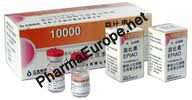 |
EPIAO 10000IU - Recombinant Human Erythropoietin Injection

| Name |
Manufacturer |
Volume |
Price $ |
Price € |
Quantity |
|
|
|

Generic name: (Recombinant human Erythropoetin)
Delivery: 10 000 IU / 1 ml ( Shenyang sunshine pharmaceutical co .,ltd)
Description:
EPO is a primary growth product in which it regulates red blood cell formation in the body. This is highly liked by long distance runners and overall endurance athletes. The red blood cell production, which involves removing and storing a quantity of blood to later replace it when in need for the transport of oxygen more efficiently, which gives the athlete a much increased boost.EPO's chemical blood doping procedure can come with its own problems with cell volume can be very dangerous, where cell concentration can reach life threatening point if the drug is used incorrectly resulting in heart attack, stroke, seizure even death. So one must be very cautious and be overlooked by a doctors assistance.
Dosage:
EPO can be given intra-muscular or intravenously, of course with intravenously it will take effect much faster. With a half-life of 4 to 5 hours long, and when administered intra-muscular half-life will be 12 to 18 hours. So when used medically the dosage is 15-50IU/kg of body weight, given three times a week.
Side Effects:
Usual side effects associated with this drug are high blood pressure, flu symptoms, joint and bone pain, tremors/chills, injection site inflammation (resides after a few days 3-4), and headaches.
EPIAO is an injectable recombinant human erythropoietin,
or EPO, that is used to stimulate the production of red blood cells in patients
with anemia and to reduce the need for blood transfusions. Anemia is a condition
in which insufficient oxygen is delivered to the body’s organs and tissues.
EPIAO is a protein-based therapeutic comparable in structure and function to
Amgen Inc.’s Epogen and Kirin Brewery Company Limited’s ESPO.
EPIAO is approved by the PRC State Food and Drug Administration, or the SFDA,
for three distinct indications: anemia associated with chronic renal failure;
red blood cell mobilization, which is the
process in which red blood cells are stimulated to proliferate, before, during,
and after surgery; and anemia associated with chemotherapy in cancer patients
with non-myeloid malignancies, which are cancers that do not originate in the
bone marrow or involve myeloid cells, or non-lymphocyte white blood cells found
in the bone marrow.
|
 |





